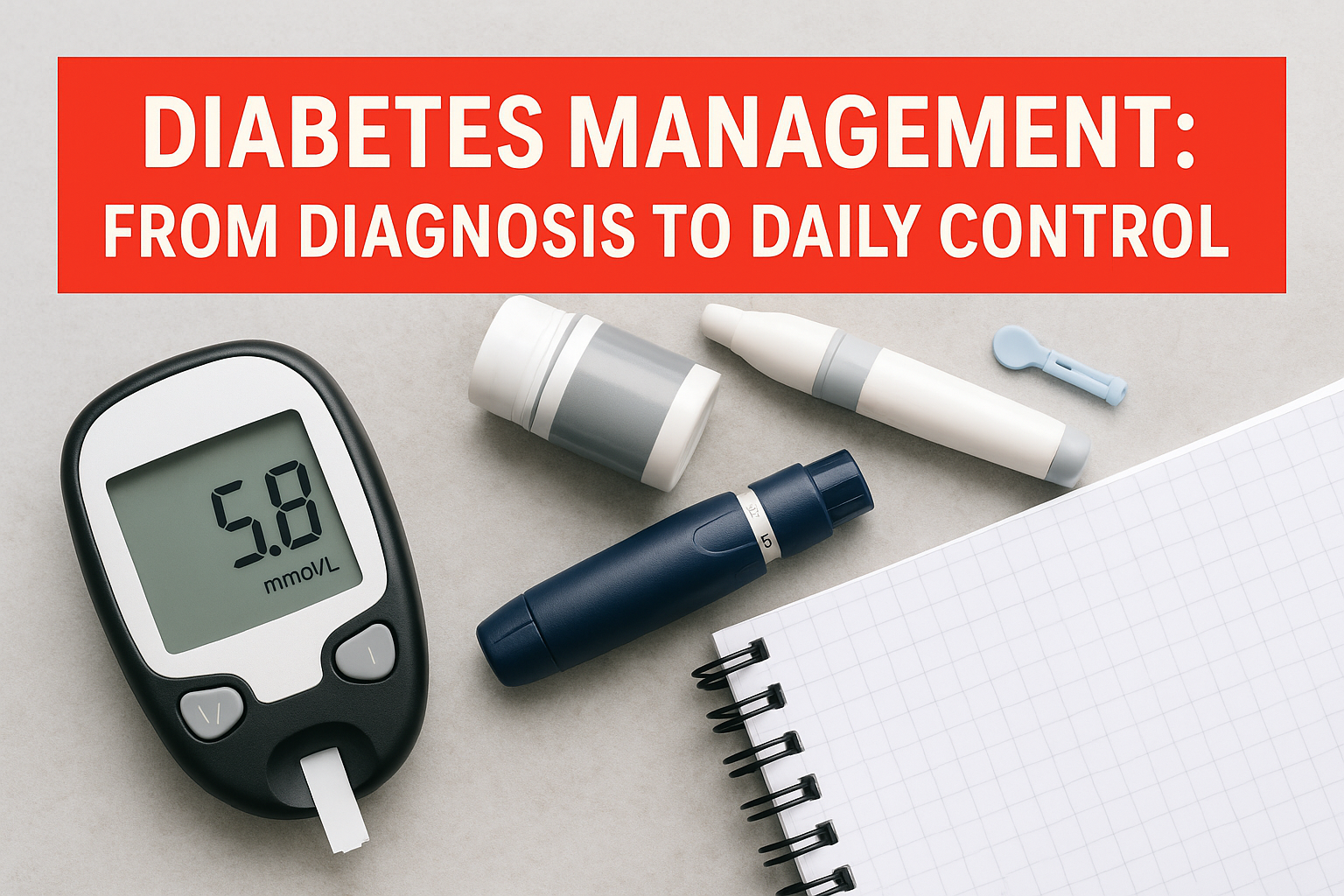
-
Posted By admin
-
-
Comments 0
How to Control Diabetes: From Diagnosis to Treatment Tips
Managing diabetes is not just about taking medicine it’s a lifelong commitment to maintaining healthy habits and making informed health decisions. For patients in Ajman, Dubai, and across the UAE, understanding how to control diabetes is vital to living a balanced, active life. This blog will guide you from diagnosis to daily control, helping you stay ahead of complications and live well with diabetes.
Understanding Diabetes: The Basics
Diabetes is a chronic condition that affects how your body turns food into energy. Most of the food you eat is broken down into sugar (glucose) and released into the bloodstream. When your blood sugar goes up, your pancreas releases insulin to help your cells absorb the sugar. In diabetes, this process doesn’t function properly.
Types of Diabetes:
|
Type |
Cause |
Common Treatment |
|
Type 1 Diabetes |
Autoimmune condition, usually early onset |
Insulin therapy |
|
Type 2 Diabetes |
Insulin resistance, lifestyle-related |
Diet, exercise, medication |
|
Gestational Diabetes |
Occurs during pregnancy |
Diet, monitoring, sometimes insulin |
Early Signs and Diagnosis
Detecting diabetes early is crucial. Symptoms may include:
- Increased thirst and urination
- Fatigue and blurred vision
- Unexplained weight loss
- Slow-healing wounds
A simple blood test can diagnose diabetes. HbA1c, fasting glucose, and glucose tolerance tests are common tools used by physicians. Early diagnosis allows timely intervention and reduces the risk of serious complications like kidney failure or cardiovascular disease.
How to Control Diabetes: Day-to-Day Tips
Once diagnosed, managing diabetes is about maintaining blood sugar levels within a healthy range. Here are three key strategies for how to control diabetes effectively:
1. Follow a Balanced Diet
Healthy eating is the foundation of diabetes control. Focus on:
- Whole grains, fruits, and non-starchy vegetables
- Lean proteins and healthy fats
- Avoiding sugary beverages and refined carbs
Tip: Use the “plate method”—fill half your plate with non-starchy vegetables, one-quarter with lean protein, and one-quarter with whole grains.
“The food you eat can either be the safest and most powerful form of medicine or the slowest form of poison.”
– Ann Wigmore
2. Exercise Regularly
Physical activity helps the body use insulin better. Aim for at least 150 minutes of moderate aerobic activity per week (e.g., walking, swimming, cycling). Exercise lowers blood glucose and improves heart health.
According to the CDC, even light activities like walking for 30 minutes daily can significantly improve blood sugar levels. Source
3. Monitor Blood Sugar Levels
Use a glucometer to check blood glucose levels as advised by your doctor. Keeping track helps you understand how food, activity, stress, or medication affects your levels.
Medical Management: Partnering With Experts
Diabetes care isn’t something to manage alone. Consulting a Diabetes management doctor in Ajman ensures personalized guidance on medication, insulin therapy, or lifestyle interventions. Regular visits help monitor complications and adjust treatment plans as needed.
If you’re unsure how to get started with diabetes care, Amtek Medical offers comprehensive checkups and support for managing your condition effectively.
Lifestyle Habits That Make a Difference
Sleep Matters
Sleep influences insulin sensitivity. Lack of sleep can spike blood sugar levels. Adults should aim for 7-9 hours of quality sleep nightly.
Manage Stress
Stress can increase cortisol, leading to higher blood glucose. Try:
- Deep breathing
- Meditation
- Time management techniques
Avoid Smoking and Limit Alcohol
Smoking narrows blood vessels, worsening diabetic complications. Excessive alcohol disrupts blood sugar balance.
Complications You Can Avoid
When diabetes is not controlled, it can lead to:
- Nerve damage (neuropathy)
- Kidney disease
- Vision problems
- Cardiovascular issues
Regular screenings and blood tests help detect issues early, allowing for prompt intervention.
Stat Insight:
In the UAE, 17.3% of the adult population lives with diabetes, and the number is expected to grow. (International Diabetes Federation – Source)
Key Takeaways
- Learn how to control diabetes through diet, exercise, and monitoring.
- Consult a Diabetes management doctor in Ajman for tailored treatment.
- Adopt habits like stress reduction, better sleep, and regular activity.
- Early diagnosis and regular checkups are essential to long-term health.
- Small daily choices can prevent major complications down the line.
FAQs
1. What is the fastest way to bring down high blood sugar?
Exercise, hydration, and insulin (if prescribed) can quickly lower high blood sugar. Always consult a healthcare provider for emergency plans.
2. Can diabetes be reversed?
While Type 1 diabetes can’t be reversed, Type 2 diabetes can be managed and in some cases go into remission through lifestyle changes and weight management.
3. How often should I monitor my blood sugar levels?
Depending on the type of diabetes and your treatment plan, you may need to check it several times a day or a few times a week. Your doctor will guide you.
4. Are there any natural ways to control diabetes?
Yes. A healthy diet, regular physical activity, weight management, and reducing stress are natural ways to control diabetes alongside medical care.
5. When should I see a diabetes doctor in Ajman?
You should consult a diabetes specialist if you’ve been diagnosed recently, your sugar levels are fluctuating, or you’re facing complications like fatigue, vision problems, or foot issues.


